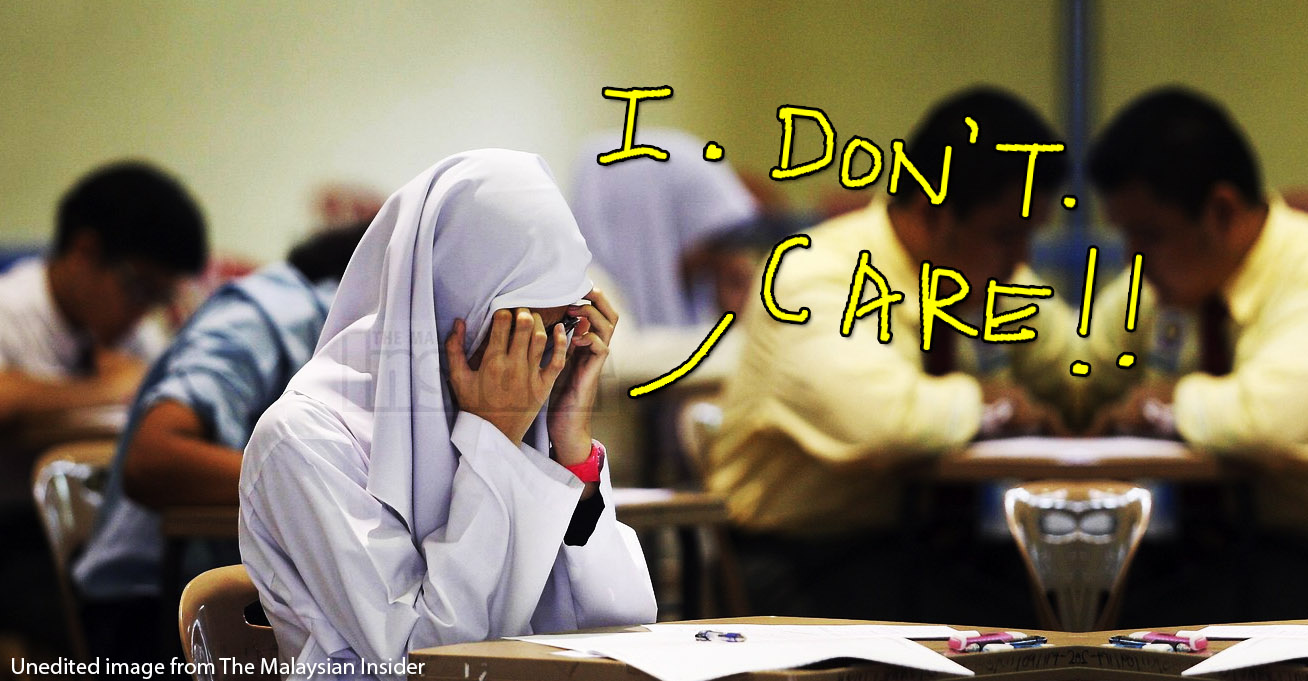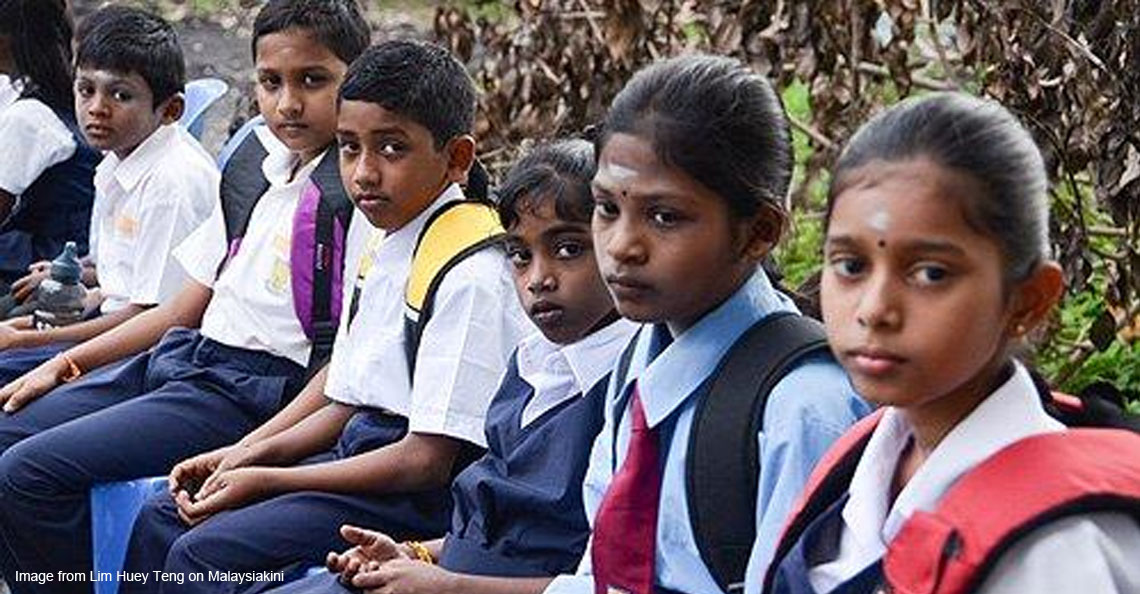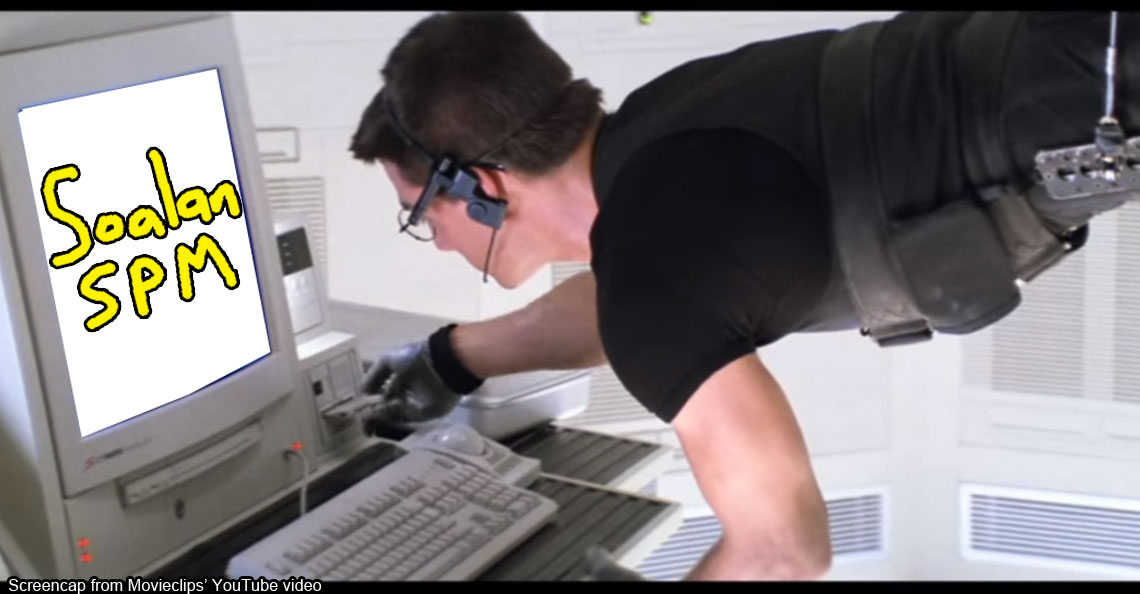7 Reasons Why Being a Cikgu Isn’t as Easy as You Think
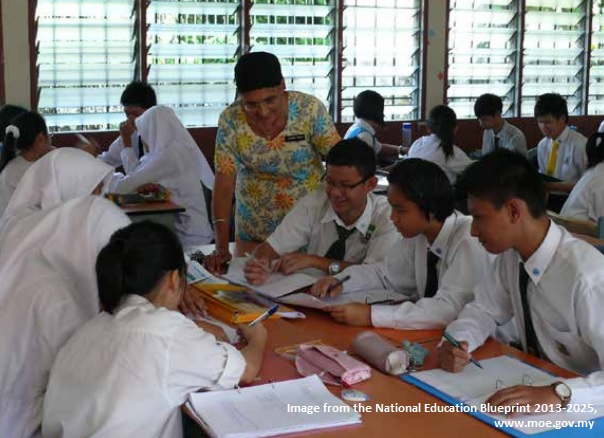
- 1.6KShares
- Facebook1.5K
- WhatsApp2
Recently, every opinion we’ve read about teachers online or off has been overwhelmingly negative. We’ve seen people rant about how cikgus goyang kaki only, that they’re just in it for steady (albeit low) pay and school holidays off, and inevitably, some dear old pakcik or makcik waxing lyrical about how “in my day, we had teachers who really cared about their students.” We’ve also seen government officials talk on and on about what they’re going to be doing to “fix” the education system and how the National Education Blueprint released last year is going to help us get there.
What we haven’t seen is what the teachers themselves think — so we thought we’d find out.
But first, let me take a selfie a primer on what’s up with our education system!
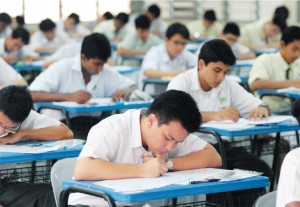
A look through the Blueprint (if you’re feeling particularly intellectual or want to drop fancy statistics to impress your friends, read it yourself here) seems to say that everything’s just dandy. After all, more students are enrolled in school than ever before, literacy rates are up, and kids are passing exams in record numbers, with more A’s than ever before! That means we must be damn smart lah right? High five!
Err, not quite lah.
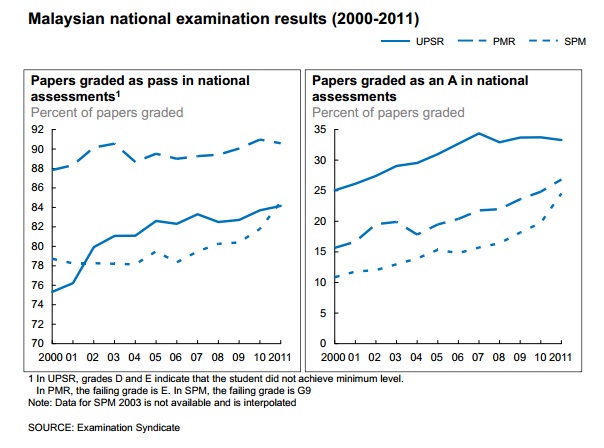
Here’s the thing. Our pass rates for national exams may be going up – but when you look at how well we’re doing on an international scale, that’s another story.
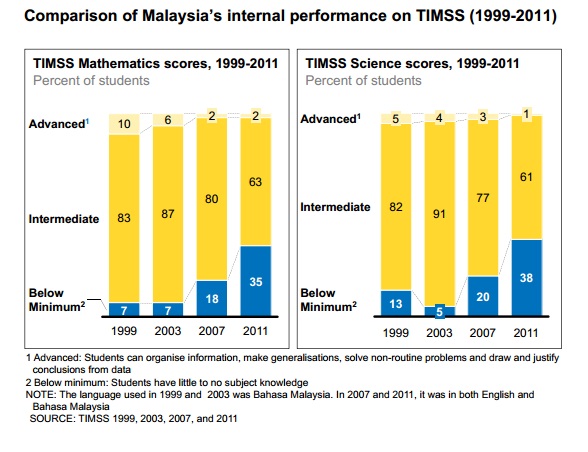
Here’s our TIMSS performance compared from year to year. TIMSS is an international assessment for Maths and Science. We did pretty well in it when we first took part in 1999, but it’s kind of gone downhill since then, with more and more of our kids falling into “below minimum” levels of proficiency, and less and less getting into the “advanced” category. Says the Blueprint: “TIMSS assesses student proficiency across three different types of cognitive skills: knowledge recall, the application of knowledge in solving problems, and the ability to reason in working through problems. Malaysian students did not perform well with regards to any of these three dimensions.”
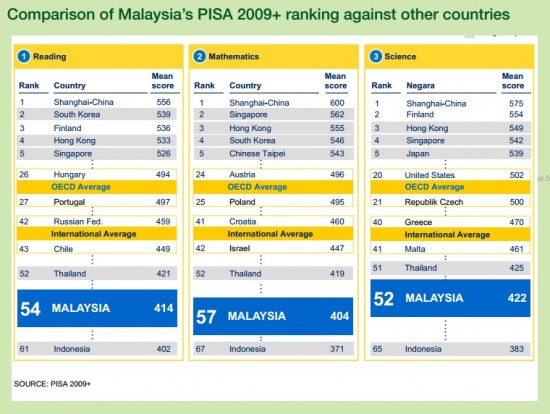
Here’s our current ranking on the OECD’s PISA. Not pizza okay, PISA: “Conducted every three years, PISA aims to evaluate proficiency in Reading, Mathematics and Science in students aged 15 years old. Its focus is not on curriculum content, but on students’ ability to apply their knowledge in real-world settings.” The results ain’t pretty. Compared to the 74 other countries who took the test, we’re way, way behind our friendly neighbours Singapore, and even got beaten by Thailand across the board.
What are these results telling us? Well, we spend a ridiculous amount of money on education (source: NEB Executive Summary, Exhibit 6), yet our students don’t know how to apply the stuff they’re learning in the real world. How lah like that? Where are we going wrong? Must be the teachers’ fault lah right? Determined to figure out what the heck is going on, we went to the educators themselves to ask them one question: What makes being a cikgu so difficult anyway?
1. They’re treated like glorified secretaries
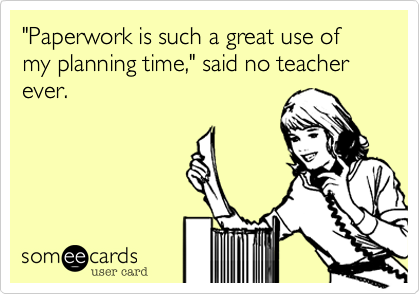
“There are many systemic problems that prevent teachers from being able to do their job well, but foremost among what I have witnessed is the administrative burden. For many teachers some 40-60% of the workload has become administrative work, especially in my school where efforts to reduce the workload on the admin staff have resulted in the transfer of this work to teachers.
From redundant tasks like having to painstakingly handwrite each and every single students name in the attendance book every month to having to input all sorts of data (that you were only told to begin collecting just before inputting it), it makes for tired, grumpy teachers who have little time or energy to plan for classes, and takes the joy slowly out of the job.” – English teacher, Kedah
2. Their job doesn’t end in the classroom
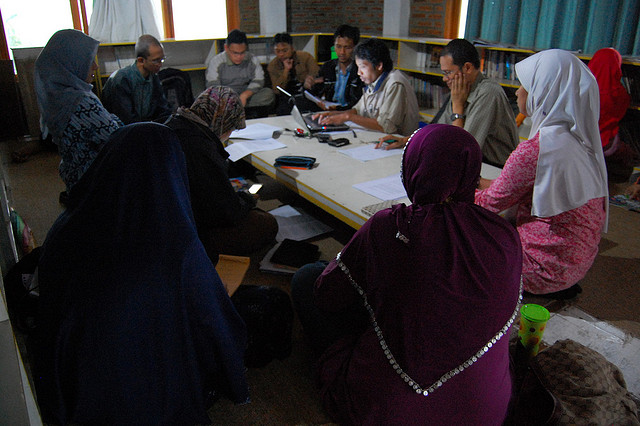
“Instead of grooming our kids with quality lesson planning, teachers have to perform extra responsibilities outside of the classroom. Endless awards, abundant competitions, and continual contest introduced by the Ministry has diluted our core responsibility. We are pushed by the administration to perform extra task that has no relationship to teaching. Anugerah Baiah, Anugerah Qualiti, Pertandingan HEM, Pertandingan 3K and more require teachers to form a committee to monitor a specific area, to update the filing system, to beautify their ‘bilik khas’, to invest their time, money and energy focusing on the criteria that need to be fulfilled instead of prioritising preparing good lessons for students. They even have an AJK specifically for ‘Tandas Lelaki!’
Besides that, teachers are made to attend unnecessary compulsory seminars and courses during weekdays such as a professionalism course that is not impactful enough to implement professionalism in our profession; online courses that need to be completed within a specific time but the system is constantly crashing; and teaching training that could be completed within a day but is stretched to 3 days.” - Sejarah teacher, Negeri Sembilan
3. They’re stuck at the end of an insanely bureaucratic food chain

“One of the biggest problems is the lack of support from the school administration and red tape involved in getting things fixed. For example, I taught the whole first half of the year in a block where there was no electricity at all. Imagine us teachers already being forced to wear corporate attire having to teach in that sweltering heat and our students trying hard to focus in the heat. The reason it didn’t get fixed was because of a combination of our school admin not pushing for a solution quickly enough and the amount of red tape it takes to get infrastructure problems fixed in schools.” - English teacher, Penang
4. Their KPIs don’t make sense

“When we only hear KPM leaders saying things like we must improve our education system so we get higher marks in TIMSS and PISA and look better, we really shouldn’t be surprised. How about teachers working hard because they feel responsible? How about wanting to improve the education system so Malaysian children learn to love the world and be excited about what they can contribute to it? Don’t think I’ve ever heard any KPM-connected leader saying that in public. Fluff, but real motivation and ideals all sound ‘fluffy’ but are so real.” - English teacher, Selangor
5. The training to accomplish their KPIs doesn’t make sense

“There’s a lot of blame going on in school. But there’s not much support going on. We have people blaming teachers for poor literacy, poor thinking skills, poor discipline, etc. But there’s not much training given to teachers to handle these scenarios. There’s also no spirit of collegiality, and not enough peer mentorship.
I used to think that Professional Learning Communities (PLC), where teachers develop by collaborating and seeking advice from one another, were the way forward. This year, it was introduced in our school. The training was poor and I’m doubtful the teachers understand it fully. Teachers grumbled about ‘more work’ – basically the tagline that teachers use for any initiative by the MOE.
Morale towards the MOE is really low, and so is any understanding of the initiatives.” - English and Mathematics teacher, Penang
6. Their supervisors don’t make sense

“Because of the millions of things that needs to be done, teachers need to prioritize their work based on orders – From PPD [Pejabat Pendidikan Daerah/District Education Departments], JPN [Jabatan Pendidikan Negeri/State Education Departments], etc. My school is very particular with this. Things will only be done if it were an edict from JPN. If there’s none, she would not allow it to be done. If we need to do initiatives on our part, we need to reach out to JPN for permission to get their letterhead to give the order to our school to take part.
But that’s not all. It means that things will never get done because JPN never dictates the school to do so. I was actually told that my school does not prioritise English because JPN have not made any comments about it. Things are only a problem if JPN sees it.” - English and Mathematics teacher, Penang
7. The system doesn’t make sense

“Our education system is both centralised and decentralised in ridiculous ways. Centralised in that all teachers across the country are all expected to do the same things. Decentralised in that difference branches of the Ministry expect different things from us — e.g., over the past month as teachers have been scrambling with ever-varying PT3 instructions and general exam prep, all class teachers have also been asked to start keying in attendance online every day, and all teachers have been told that we each need to do about 18 hours of online modules on an online mind-mapping exercise before the end of the year. Of course, both online systems are inadequate for volume. Both flexibility and streamlining are in order.” - English teacher, Selangor
——–
So basically, Malaysian teachers take on some of the most ridiculous tasks you can think of in order to educate our students – and still get flak when they don’t do that as well as we think they should. This doesn’t even cover parents who think teachers should solely be responsible for turning their kids into miraculously productive citizens of the country, or kids who show nothing but disrespect and even violence (!) to teachers if and when they please.
Sure, there are bad apples in any profession – just as there are good ones. But we think a little more understanding, and a lot more collaboration, is the key to making our education system what we want it to be – not playing some pointless blame game.
The good news is that the Blueprint does acknowledge some of these concerns and has outlined initiatives to set at least some of it right. But this is a process that will take time and effort, and we’ll be watching with interest to see how it plays out.
Until then, do us a favour — if you have a teacher in your life, give them a hug or high five RIGHT NOW. Terima kasih, cikgu!
- 1.6KShares
- Facebook1.5K
- WhatsApp2

